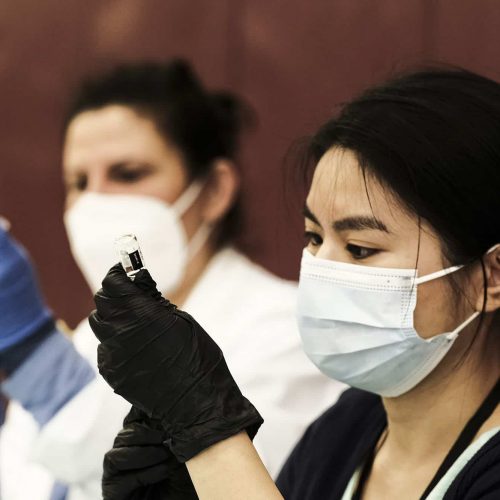Introduction
Hospitals full. Metrics for cases blaring in bright red. Urgent calls from public officials for residents to comply with pandemic precautions.
But this wasn’t a year ago, when the nation was new to the coronavirus, or even this winter, when American cases peaked. This was a few weeks ago in Michigan springtime, with roughly a quarter of residents there already fully vaccinated, including most of the state’s elderly population.
Could what happened in Michigan last month still happen somewhere else?
The outbreak there was the nation’s worst this spring. Though deaths remained relatively low, probably thanks to the large number of elderly patients vaccinated, daily cases and hospitalizations rivaled the state’s autumn surge. Most days in April, Michigan saw more than 4,000 people test positive for the coronavirus. Hospitals reported more young and middle-aged patients coming in with severe illness. Experts thought the outbreak was at least partly driven by the new, more transmissible “United Kingdom” variant of the coronavirus.
Just like the rest of the pandemic, the recent outbreak hit Michigan minorities harder. Blacks make up roughly 14% of the state’s population but in April were roughly 20% of those with cases of COVID-19 severe enough to be hospitalized, according to data from a University of Michigan tracker.
And if past patterns hold, the surge will likely leave some Michigan coronavirus survivors with lingering symptoms.
But cases, deaths and hospitalizations have leveled off there in recent days. And that’s leaving some experts feeling upbeat.
“There is still the capacity for locally significant events,” like the outbreak in Michigan, said William Hanage, a Harvard University epidemiologist. But “I’m feeling slightly optimistic. I’m hoping that the combination of vaccination and the weather means that we have managed to just outrun [the U.K. variant].”
Michigan, like Israel, may have reached a tipping point with its number of residents vaccinated or already infected, said Dr. Monica Gandhi, professor of medicine at the University of California San Francisco, giving the virus fewer paths to spread. Israel faced surging coronavirus cases earlier in the year but saw those numbers plummet when it had vaccinated roughly 40% of its population, she said. Michigan has now given first jabs to roughly half its residents.
“It’s all cause for optimism,” she said, thanks to the highly effective coronavirus vaccines. Any further major statewide outbreaks are “just because you can’t put it in everyone’s arms at once.”
Hanage said he’ll be watching states like Florida closely, as the reasons behind last summer’s case surge in the Sunbelt remain a mystery. Some experts theorized it was because more people gathered indoors in the hot temperatures.
“If that happens again, it’s going to happen with a nastier virus,” he said.
And Gandhi said she’s keeping an eye on Washington and Oregon, where hospitalizations have been ticking up in recent weeks.
Experts say the more people are vaccinated, the firmer control their regions will have over coronavirus outbreaks, even if they haven’t technically reached “herd immunity” — the point when the amount of immune people in a population can prevent an infectious disease from reaching even those who are not immune.
But pushing vaccination rates higher may be a challenge in some areas. Vaccinations in Michigan have slowed, even as the state witnessed soaring case numbers and hospitalizations. State officials hadn’t expected vaccine supply to outpace demand until later this month, said Kerry Ebersole Singh, executive director of the Protect Michigan Commission, an advisory group appointed to help the state vaccinate residents.
“We’re just there a little bit earlier than expected,” Ebersole Singh said. She is working to help get vaccines out to rural communities and home-bound seniors and increase the number of mobile clinics. “Convenience is the ballgame, I think, at this point.”
Liz Essley Whyte is a reporter at the Center for Public Integrity. She can be reached at lwhyte@publicintegrity.org. Follow her on Twitter at @l_e_whyte.
Read more in Inside Public Integrity
Watchdog newsletter
Secret practice that allows the transfer of prisoners doesn’t always protect them
Prisoners like Derek Chauvin are often moved out of state to serve their time. The public is in the dark about how prison officials decide who gets transferred.





Join the conversation
Show Comments